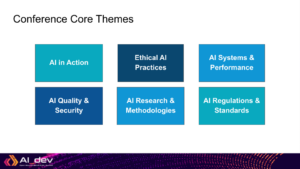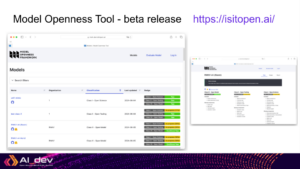AI_dev Europe brought together developers, researchers, and industry leaders in Paris, France, from June 19-20 to explore developments in open source generative AI and machine learning. Through a series of insightful keynotes, in-depth sessions, and interactive discussions, participants gained a comprehensive understanding of the current landscape and the emerging trends shaping the future of AI.
Conference Sessions can be viewed here.
Conference Highlights
AI_dev Europe 2024 offered a broad spectrum of topics across six major themes, reflecting the diverse and dynamic nature of AI development.
Each theme was explored through detailed presentations, panels, and interactive sessions, offering attendees a comprehensive view of the current landscape and future potential of AI technologies.
Keynote Announcements
The summit began with a welcome keynote by Ibrahim Haddad, Executive Director of LF AI & Data. In the keynote, Databricks was announced as a new Premier Member of the LF AI & Data Foundation. Delta Lake was also introduced as the latest incubation project and Unity Catalog as the newest sandbox project at LF AI & Data.
The Model Openness Framework (MOF) enhances transparency and reproducibility in AI development by providing clear guidelines on component availability, licensing, and commercial use. The beta release of the Model Openness Tool (MOT) at AI_dev invites model creators to promote openness in AI model licensing. MOT evaluates each MOF criterion and generates a user-friendly score, offering a straightforward way to apply the MOF framework to your model.
Overview of Sessions
Each of the six conference themes previously mentioned provided a comprehensive view of both current achievements and future potentials in AI technologies, emphasizing a holistic approach to understanding and advancing the field of generative AI and machine learning. Let’s dive deeper into each session theme.
AI in Action
This theme showcased practical applications and innovations in AI technology. Speakers from diverse organizations demonstrated how they leverage open source tools to enhance machine learning processes and integrate AI into various sectors. Highlights included the introduction of Moxin, a tool for running large language models (LLMs) on personal devices, and discussions on device-agnostic ML training and inference with tools like Hugging Face Accelerate. This theme aimed to provide attendees with actionable insights into deploying AI technologies effectively.
AI Quality & Security
Focused on the integrity and security of AI systems, this track addressed the challenges in ensuring AI models are both effective and safe. Topics covered included strategies for reducing errors in model outputs (“hallucinations”), evaluating retrieval-augmented generation (RAG) pipelines for accuracy and efficiency, and identifying risks within the supply chain of open-source AI models. This segment was essential for developers looking to enhance the reliability and security of their AI applications.
AI Regulation and Standards
This track delved into the complex landscape of AI governance and standardization. It featured discussions on the Model Openness Framework, which aims to provide clarity in the generative AI space, and explored how upcoming regulations could impact open innovation. Additionally, the role of AI Software Bills of Materials in aligning with the EU AI Act was examined, focusing on ensuring compliance and transparency in AI deployments. This theme was crucial for understanding the evolving regulatory environment and its implications for AI development.
AI Research and Methodologies
Exploring the frontier of AI research, this theme highlighted advanced methodologies and the latest research in the field. Sessions included discussions on building and training large language models using open-source methods, accelerating AI workflows on the cloud, and leveraging knowledge graphs for more equitable AI. This theme aimed to push the boundaries of what’s possible with AI by sharing cutting-edge research and innovative techniques.
AI Systems and Performance
This theme addressed the technical aspects of AI systems, focusing on performance optimization and infrastructure. Presentations covered topics like deploying high-quality LLMs, optimizing Kubernetes for generative models, and powering AI workloads with advanced hardware solutions. This track was geared towards technical professionals looking to enhance the efficiency and effectiveness of their AI systems.
Ethical AI Practices
Highlighting the importance of ethics in AI, this track featured discussions on democratizing AI through digital public goods, crafting community-powered futures, and navigating the ethical landscape of responsible AI practices. The introduction of the Software Carbon Efficiency Rating for LLMs exemplified the focus on sustainability. This theme was vital for fostering a more ethical and responsible approach to AI development and deployment.

Looking Ahead
AI_dev Europe 2024 has set a dynamic precedent for future discussions and advancements in open source generative AI and machine learning. Each session and keynote provided valuable insights that not only enhance our understanding but also propel us toward more innovative, secure, and ethical AI applications. We are grateful to all participants—speakers, sponsors, and attendees—for their roles in creating a successful summit.
The next AI_dev event will be held in Tokyo, Japan and the Call for Proposals is open until July 7, 2024. Together, let’s continue to shape a future where open source AI leads to broader innovation and greater global collaboration. Let’s keep the momentum going and meet again with renewed ideas and enthusiasm to further advance the field of open source AI.
LF AI & Data Resources
- Learn about membership opportunities
- Explore the interactive landscape
- Check out our technical projects
- Join us at upcoming events
- Read the latest announcements on the blog
- Subscribe to the mailing lists
- Follow us on Twitter or LinkedIn


